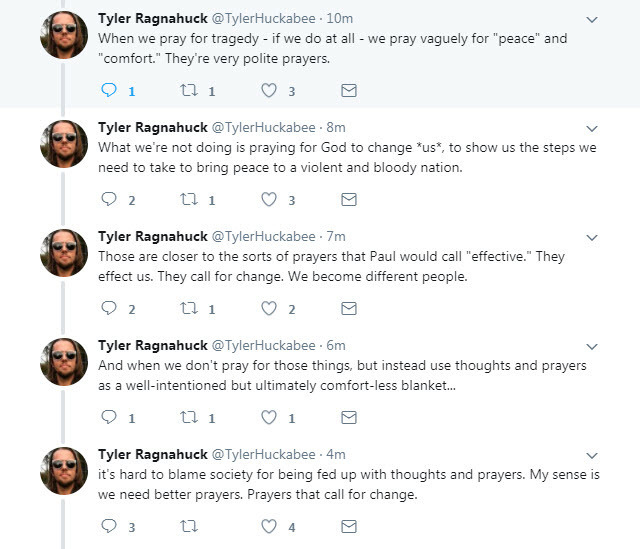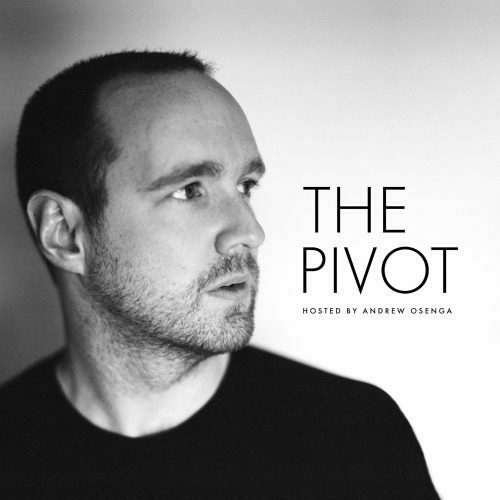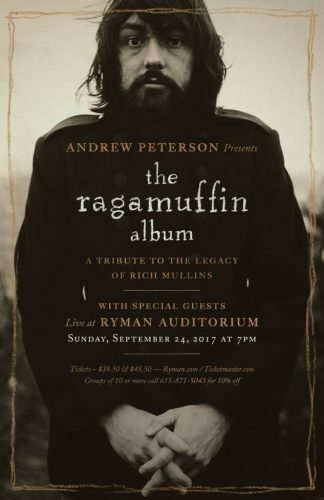Category: Longform
You are viewing all posts from this category, beginning with the most recent.
Jesus' Appeal to Human Emotion and Reason
Some really fascinating thoughts from Richard Beck this morning on Jesus’ appeal to human emotion and reasoning as a part of His teaching:
Jesus also used human experience as a hermeneutical and theological tool. In Matthew 12 Jesus enters a synagogue on the Sabbath and finds a man with a withered hand. The way the Pharisees interpreted the Sabbath laws prohibited Jesus from healing the man. But Jesus disagrees, and he makes an appeal to human experience to argue for a different hermeneutical approach to Sabbath keeping. Jesus doesn’t appeal to Scripture or tradition, he asks a question about how something would feel. “How many of you,” Jesus asks, “if a sheep of yours fell into a ditch on the Sabbath, wouldn’t pull it out?” Jesus asks the Pharisees to imaginatively place themselves in this situation, asking them to consult their feelings, experiences and reactions. Jesus expects this appeal to experience to lead to an affirmative answer: They would grab the sheep out of the ditch, even on the Sabbath.
This intrigues me. The conservative circles I inhabit are fond of dismissing claims to human emotion and reason as a hermeneutical tool. (Or at least when that emotion and reason doesn’t challenge the conclusions of the existing theological framework.) If we are totally depraved, the reasoning goes, our emotions and reasoning are also totally depraved and therefore untrustworthy.
I tend to think that our intrinsic moral reactions, while fallen, still hold the echoes of what it means to have been created in the image of God, and as such, they shouldn’t be easily dismissed. Beck gives me another angle here to consider that thought.
Some Thoughts on Thoughts and Prayers
The familiarity of yesterday’s breaking news alerts almost muted the shock. Half a church dead, the other half wounded. I’m old enough to remember the Luby’s shooting, which at the time was nearly unimaginable. And we can name the shootings that followed in the next 25 years in a horrific litany: Columbine. Sandy Hook Elementary. Virginia Tech. San Bernardino. Mother Emanuel Church in Charleston. The Pulse nightclub in Orlando. Las Vegas. And now, hardly before the crime tape was down in Vegas: First Baptist Church of Sutherland Springs.
The online response comes in three stages and is by this point, sadly, completely predictable:
Stage 1: Thoughts and Prayers House Speaker Paul Ryan called for prayers.

Same from Texas Governor Greg Abbott. And from Senate Majority Leader McConnell. And from the chairman of the Senate Homeland Security committee. And on and on and on.
Stage 2: The Backlash These range from the political from Senator Elizabeth Warren:

to the full on blast furnace from Wil Wheaton,

(who later tempered his remarks just a bit.)
Stage 3: The Persecution Complex
Christians, offended by the anger against the expression of prayers, start feeling put upon. Such as this example from First Things editor Matthew Schmitz:

And so it goes, back and forth, until the shooting passes from the news cycle either by natural decay or by the violence of yet another tragedy.
I have sympathies on both sides of this one.
I’m a Christian. God tells us to pray. I believe that prayer is effective. I’ve seen it work. Sometimes we pray and God works in direct, miraculous ways. But other times (and in my own limited experience, the majority of the time) we pray, and God works through someone else. Sometimes God even uses us to work out the answer to our own prayers. So I want to be sympathetic with the prayers of Christian political leaders. They go up with my own.
But I’m also sympathetic with the ragers. Wil Wheaton is no Christian. I don’t expect him to believe that prayer is effective. I think he’s angry with Christians like Paul Ryan not because they’re praying, but because they don’t seem to be doing anything else.
I don’t think legislation is the 100% solution to gun violence, but Republican leaders could push for real changes that would help things. To proclaim that you’re praying but then not do whatever else is within your power to address the issue is hypocrisy. And that’s reason enough to anger believers and unbelievers alike.
And to those who immediately start feeling hurt that people are criticizing the church? Maybe it’s time to take a hard look in the mirror. Maybe we deserve that criticism. Maybe we should provide them examples of Christians who are praying and also acting.
As I am finishing up this post, Tyler Huckabee has a twitter thread that captures this a lot more pithily than I have. Here’s how he brings it home:

That’ll preach.
Finished reading: fiction!
Two weeks, two business trips, it was time for light reading. Trolling the fiction shelves found me these:
Dale Brown has managed to crank out 21 books in the Patrick McLanahan series over the past 30 years. I’ve read far too many of them. They crossed the line into ridiculousness several books back… and this one is no different. This one reads more like the script for a direct-to-video action movie (a genre, I fear, that has been killed off by Netflix!) than a proper novel.
Tom Clancy - Point of Contact by Mike Maden
Tom Clancy is long dead and buried but his name and book series lives on. According to Amazon, this book is “Jack Ryan Universe book #23”, which is roughly the same output as Dale Brown’s series in roughly the same timeframe. This one was thin enough that, writing this post a couple weeks after finishing the book, I have exactly zero recollection of what this one was about.
The Rise and Fall of D.O.D.O. by Neal Stephenson and Nicole Galland
Now this one was worth my time. While it starts out seeming to be about ’the return of magic’, it’s much more an adventure in time travel combined with some humorous observations about how bureaucracy can take over and ruin even the best ideas. I had a lot of fun here.
Land of My Sojourn
A Rich Mullins song as timely today as it was when it came out back in 1993.
And the coal trucks come a-runnin’
With their bellies full of coal
And their big wheels a-hummin’
Down this road that lies open like the soul of a woman
Who hid the spies who were lookin’
For the land of the milk and the honey
And this road she is a woman
She was made from a rib
Cut from the sides of these mountains
Oh these great sleeping Adams
Who are lonely even here in paradise
Lonely for somebody to kiss them
And I’ll sing my song and I’ll sing my song
In the land of my sojourn
And the lady in the harbor
She still holds her torch out
To those huddled masses who are
Yearning for a freedom but still it eludes them
The immigrant’s children see their brightest dreams shattered
Here on the New Jersey shoreline in the
Greed and the glitter of those high-tech casinos
Some mendicants wander off into a cathedral
And they stoop in the silence
And there their prayers are still whispered
And I’ll sing their song, and I’ll sing their song
In the land of my sojourn
Nobody tells you when you get born here
How much you’ll come to love it
And how you’ll never belong here
So I call you my country
And I’ll be lonely for my home
And I wish that I could take you there with me
And down the brown brick spine
Of some dirty blind alley
All those drain pipes are drippin’ out
The last Sons Of Thunder
While off in the distance the smoke stacks were belching back
This city’s best answer
And the countryside was pocked
With all of those mail pouch posters
Thrown up on the rotting sideboards of these
Rundown stables like the one that Christ was born in
When the old world started dying
And the new world started coming on
And I’ll sing His song, and I’ll sing His song
In the land of my sojourn
A healthier approach to a mid-life crisis...
Andrew Osenga started a new podcast earlier this year called The Pivot. Episode 3 is his discussion with musician, producer, and composer Don Chaffer. Toward the end of the interview, Don talks about how he’s started writing for musical theater, and how it provides an outlet that he needs as a 40-ish father and husband.
…when you have kids in particular you just give and give and give and give. And one day you wake up and you’re like ‘what do I get, what’s my part in this thing? Because I used to do a lot of stuff I liked… sometimes I would go out to eat or watch a movie! That was crazy!’. I told a monk friend of mine one time, he said ’tell me everything’. And I said ‘well I feel like between family and work I’ve got nothing left.’ And he said “yeah! and a hundred years ago you’d be dead by now, too.” So, there’s just something about this phase of life, it’s just - he’s like, ‘people died at that point just because they were too pooped to keep living’. And I feel like - so that’s what a mid-life crisis is. You hit these limitations and you think ‘I’d rather have, you know, a Corvette and a hot blonde with a boob job. And so you do these crazy stupid things, blow up your whole life. And it’s like – one of the jokes I’ve made is that my mid-life crisis was music theater instead of hookers and blow. But it’s true. I think that it became - one of the things I realized is that you find a healthy outlet to give yourself some space, to do some things you enjoy. Because that’s important. You can’t live on only sacrifice. It ends up being a negation. While love and sacrificial love are endless, hypothetically, they aren’t for a human, right? They’re only endless because they come from somewhere else. There’s some point you kinda run yourself out and you realize ‘I don’t have infinite capacity here to be a loving husband and father. I’ve gotta do something for myself.’ The other piece of it for a marriage is to try to invite each other into it together. Not necessarily doing the same things, because usually that isn’t going to help - you need space from each other - but invite each other into that headspace of like, ‘do some things for yourself. I’ll do some things for myself. We’ll get a babysitter if we can afford it. Or swap. I’ll take the kids tonight, you take them on Wednesday.’
I resonate with that more than I’d like to admit many days. (I bet my wife does, too.)

Over-reaction?
This is a good word…
When we call the lamentations of others Over-reaction without first pursuing knowledge as to what ails them; we expose loveless privilege.
— Kyle J. Howard (@KyleJamesHoward)
Finished reading, part the next
A rundown of recent book completions:
A People’s History of Christianity: The Other Side of the Story by Diana Butler Bass
Bass is clearly giving a nod to Zinn’s People’s History of the United States with her title and approach. It’s not a bad effort, but nothing really earth-shattering, either.
The Art of Curating Worship: Reshaping the Role of Worship Leader by Mark Pierson
Pierson is an Australian who was writing from a very strong emergent perspective. While the worship experiences he describes are a long way from what would work in my midwestern US church, his perspective on the intent of and attitude toward leading worship was right on and gave me a lot to think about.
Khrushchev: The Man and His Era by William Taubman
A very readable biography of the Soviet leader. Still hard to get a grasp on how someone can be so human and yet so depraved.
Parable of the Sower by Octavia E. Butler
This was the first I’ve read of Butler. Won’t be the last. A wonderful voice in dystopian fiction.
Abraham Joshua Heschel: Prophetic Witness by Edward Kaplan
The first of two volumes of biography of a fascinating Jewish thinker from the early 20th century. Now I’ve gotta get volume two.
The Switch by Joseph Finder
I was wanting mindless entertainment, and this book overachieved at that. By which I mean it was even more mindless and boring than I was hoping for. Meh.
Andrew Peterson and Friends: The Ragamuffin Album, Live at the Ryman
Last Sunday night I had the privilege of attending an Andrew Peterson-organized and -led concert honoring the legacy of Rich Mullins at the Ryman Auditorium in Nashville. Peterson and his cadre are roughly my age, and we share a deep debt to Mullins, who in his all-too-short musical career penned songs that showed that Christian music could be artistic, poetic, and honest in ways we hadn’t before seen. (Andrew wrote an essay for the concert booklet telling his Rich Mullins story that’s well worth a read. It’s posted on The Rabbit Room.)

This year is the 20th anniversary of Mullins’ death in a car accident, and served as an opportunity for Peterson to round up his friends and prepare the music. The Ryman was packed to capacity with an audience that clearly loves Rich’s music just as much as the musicians themselves do; the concert was punctuated with opportunities for the audience to sing along, starting from an impromptu acapella chorus of “Awesome God”, which Peterson led “just to get it out of the way”. (While it’s perhaps Mullins’ best known song to the general public, it’s certainly not his favorite among his more devoted fans.)

Peterson and friends followed a concert format that he has perfected over years of touring his Behold The Lamb of God Christmas tour. The first half of the concert rotated in each of the guest artists to sing a Mullins song of their choice, with AP sneaking a few of his own choices in along the way.
When we hit intermission I told my wife that I couldn’t think of another Rich song that I was disappointed that they hadn’t played in the first half. The set list:
- “Awesome God” - AP
- “Calling Out Your Name” - AP
- “Boy Like Me/Man Like You” - AP
- “Hard to Get” - Andy Gullahorn
- “Cry The Name” - Jill Phillips
- “What Susan Said” - Andrew Osenga
- “The Howling” - Jeremy Casella
- “Screen Door” (complete w/ cups) - Brandon Heath & Mitch McVicker
- “You Did Not Have A Home” - Finnegan Bell
- “Elijah” - Matt Giraud
- “Buenos Noches from Nacogdoches” - Leigh Nash
- “Bound to Come Some Trouble” - Mitch McVicker
- “If I Stand” - AP

The second half of the concert brought each of those artists back out in turn to perform note-for-note versions of each song from Rich’s masterpiece A Liturgy, A Legacy, and a Ragamuffin Band. A string section played the original string charts as provided by Rich’s producer Reed Arvin (who himself was present and played the piano on “Creed” midway through the second half).
To my critical ear they were indeed almost exactly note-for-note and lick-for-lick. Gabe Scott had his hammered dulcimer skills tested and found awesome. My specific criteria for this evaluation was the little turn from the second verse into the pre-chorus of “Peace” - there’s a drum fill, a bass slide, and a little guitar riff that come together in a sublime little moment that I’m probably the only person in the world who cares about. They nailed it. The only place they diverged was I think they gave Andy Osenga an extra couple choruses to play a smoking guitar solo on the end of “How To Grow Up Big and Strong”… but ain’t nobody gonna complain about that.

The second half setlist:
- “Here In America” - AP
- “Isaiah 52:10” - Jill Phillips
- “The Color Green” - AP
- “Hold Me Jesus” - Brandon Heath
- “Creed” - AP, Andy Gullahorn, and Jill Phillips
- “Peace” - Andy Gullahorn
- “78 Eatonwood Green” - Gabe Scott on the hammered dulcimer
- “Hard” - Finnegan Bell
- “I’ll Carry On” - Jeremy Casella
- “You Gotta Get Up” - Leigh Nash
- “How To Grow Up Big and Strong” - Andrew Osenga
- “Land of My Sojourn” - AP
Even they they weren’t quite done. Peterson brought the full cast of musicians out and led the (now standing) audience in “Step By Step” (with guest vocals by Peterson’s daughter Skye) and the call-and-response of “I See You”, which itself leads back in to one final chorus of “Step By Step”. After some final applause, Peterson did his trademark exit, singing the first line of the Doxology, and then exiting the stage as the audience finished singing it. (1200 people singing the Doxology in the old Ryman auditorium: chills.)

Hearing so many of Rich’s songs in one sitting highlighted both the artistry and prophetic nature of his lyrics. For instance, the last few lines from “Hard”:
I am a good midwestern boy
I give an honest day’s work when I can get it
I don’t cheat on my taxes, I don’t cheat on my girl
I’ve got values that would make the White House jealous
Peterson wondered aloud (perhaps just as much as he dared) whether Rich had any idea those words would still resonate so loudly 25 years after he wrote them. But the lines that stood out even more loudly to me were from “Land of My Sojourn”:
And the lady in the harbor
She still holds her torch out
To those huddled masses who are
Yearning for a freedom that still eludes them
The immigrant’s children see their brightest dreams shattered
Here on the New Jersey shoreline in the
Greed and the glitter of those high-tech casinos
Some mendicants wander off into a cathedral
And they stoop in the silence
And there their prayers are still whispered
And I’ll sing their song, and I’ll sing their song
In the land of my sojourn
The list of concerts I’ve attended isn’t as long as I’d like - and shorter thanks to the U2 concert in St. Louis getting cancelled last weekend - but Sunday night at the Ryman has to be right up there at the top of the list. Peterson posted on Facebook the next day that it might have been his favorite concert ever. I’d be inclined to agree with him.

Liberty and Holiness
In a Facebook discussion recently on a mildly contentious topic, a friend brought out a line of argument that has me ruminating. Here’s what he said:
I think there is a lot to be said for the liberty we Christians have to partake of things, but there are certainly things the world has devised that are inherently unpleasing to God in any form. The question is - are we certain enough - do we have enough firm evidence that these [disputable] practices discussed above are absolutely not going to offend God that we can participate in them with a clean conscience? I know this - I have been bought with a very high price - the blood of Christ, and all too often, I do not reflect that in my conduct, but I should. I hope that we all are moved by that high price to think not of how far out to the boundaries of God’s permission we can roam in our conduct, but how near to Christ we can get.
This is a familiar argument in many ways. (How many times have I heard this as the preferred answer to lusting teens asking “how far is too far?”!) And indeed, it seems almost foolhardy to try to argue against the “how near to Christ can you get?” position. But on this question of liberty and holiness I think we could frame things up a little differently.
First, liberty and holiness are not two ends of the same spectrum. Here we need to distinguish between liberty in permissible things and freedom to sin. Freedom to sin using the excuse of abundant grace is clearly out of bounds (Romans 6:1). But liberty in matters of conscience is something different. When Paul instructs the Corinthians about meat sacrificed to idols, there is no suggestion that meat is OK, but not eating meat is more holy. There is holiness in exercising liberty.
Second, all good things come from God. “Every good gift and every perfect gift is from above, coming down from the Father of lights…” (James 1:17). Paul tells us that “God… richly provides us with everything for our enjoyment” (1 Timothy 6:17). God has not called us to be dour ascetics. Rather, he has called us to explore and enjoy His goodness to us in His creation. Which leads me to my last thought.
While I can hardly criticize a desire for holiness, at times I wonder if people may stress this desire to hide an underlying sense of fear or unease: fear of God moving in unexplained ways, fear of the Holy Spirit speaking unexpectedly, fear of seeing things that look like God working outside of the careful boundaries we’ve come to expect He should work in. And while we need to be ever sensitive to the Spirit’s leading when some particular idea or practice might be truly too far, we can do ourselves a disservice if we approach each experience or opportunity with suspicion instead of expectation. If, for example, the steak from the pagan butcher or the unfamiliar lectio divina is partaken with a prayer of expectation and a request for God’s blessing, why should we fear it?
“Which of you fathers, if your son asks for a fish, will give him a snake instead? Or if he asks for an egg, will give him a scorpion? If you then, though you are evil, know how to give good gifts to your children, how much more will your Father in heaven give the Holy Spirit to those who ask him!” (Luke 11:11-13)
My friend’s argument in questionable areas, if I can paraphrase, seems to be that “the default answer should be ’no’ unless you’re really, really sure that it can be ‘yes’”. What I’d like to advocate for, though, is to turn that around; that we can, without fear, start with a default answer of ‘yes’, trusting that the Holy Spirit will make clear when the answer should instead be ’no’.